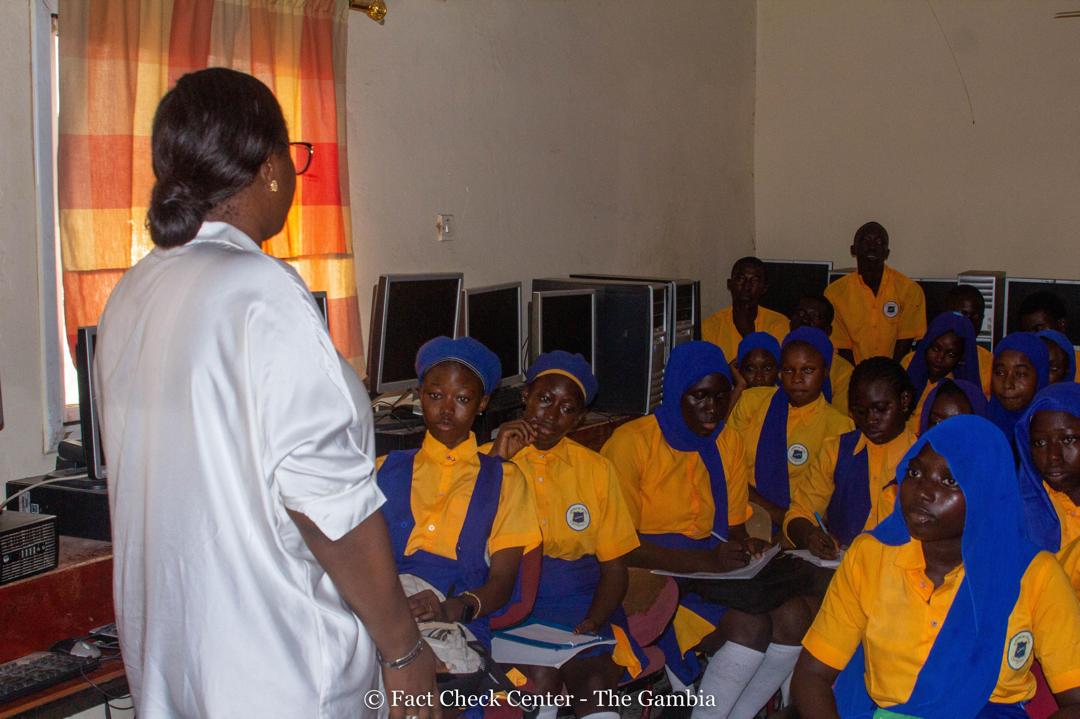The International Center for Journalists’ (ICFJ) Disarming Disinformation initiative is a three-year program, supported by the Scripps Howard Foundation, that aims to slow the spread of disinformation through multiple programs such as investigative journalism, capacity building and media literacy education. ICFJ partnered with MediaWise from the Poynter Institute to develop and deliver media literacy programming.
The media literacy training of trainers program accepted global participants for two different cohorts. The participants are community leaders who will educate others on the importance of media literacy and how to apply those skills in real life. The article below is one of five impact stories selected from the first cohort in celebration of media literacy week.
For three years, Mariama Danso and the organization she leads, Fact Check Center - The Gambia, have promoted media literacy among young adults to combat mis- and disinformation in the Banjul region of The Gambia. She and her outlet found it difficult to reach younger school students, however, due to financial limitations and a lack of access to schools in the region.
In 2023, Danso took part in ICFJ’s media literacy training of trainers, run in partnership with MediaWise, in Nairobi, Kenya. During the training, she learned new strategies to reach diverse audiences, taking into account their unique contexts and interests. "This program taught me how to develop my training from scratch," Danso said. "It taught me to think first of who my audience is, what issues affect them [and] what issues they are interested in.”
After the workshop, Danso received a grant to conduct media literacy trainings of her own for secondary school students across The Gambia.
She held her first training in May at Mayork Senior Secondary School in the West Coast Region, for 40 students over two days. The school gave her access to a teaching space, and provided meals for the students and accommodation for her team. Danso also used her grant funds to cover the students’ transportation costs to attend the training. “All sessions had a token of appreciation,” she said. “I made sure not to mention to [students] that there was a token to cover for their transportation as a way of ensuring they were not participating because of [it].”
That same month, Danso also led a training on the Soma FM 88.8 community radio station in which she discussed scam funding opportunities for farmers, false profiles of political figures and misinformation that people spread unknowingly. “This program should be a continuous program,” said one listener. “I have learned from [Danso]’s discussion that I have been spreading malinformation all these past years, but I never knew about it.”
Danso held workshops for another 60 students across the country in the months that followed. Today, she trains people of all ages on media literacy, including school teachers.
Meeting participant needs
Danso began her trainings for the students by having them fill out a questionnaire to learn about their personal experiences with, and assess their knowledge about, disinformation, fact-checking and more. “The term[s], disinformation, misinformation and media literacy, [were] new to all my participants despite most of them having access to the internet,” said Danso.

The questionnaire also helped her identify examples of disinformation content that would resonate with the students. “They were surprised at the fact that most of them [had] come across the first examples I shared with them. [Almost] 90% of them clearly told me, ‘oh we shared this information with our friends,’” she said.
Her workshops were interactive, intended to keep the students constantly engaged. In one exercise, for example, Danso would share a piece of disinformation she designed about the students’ school and asked them to assess its veracity and explain how they reached their conclusions.
Addressing offline disinformation
Just over half of The Gambia’s population uses the internet, according to 2022 data from the World Bank. Addressing false rumors that spread offline, as a result, is important.
“Three to five students stood out during [one] session – they had no phone, no social media,” said Danso. This was an opportunity to teach students about rumors or disinformation that spread through “Kaa am na,” or word-of-mouth gossip. “What do you do with the information your friend gives you as 'Kaa'?'" Danso asked. “Sometimes you don’t trust the source of the information,” answered one student. Another said, “sometimes you trust the information a little but not the source.”
The responses led to a conversation about the kernel of truth theory. “In every rumor, there is a hint of truth,” Danso told the students. “Moments [when] we have real-life conversations about false information and information spreading by word of mouth, participants give me the best of them.”
Impacts and the future
Her efforts at the Davinci School in Sukuta, in particular, had encouraging impacts. “Immediately after the training ended, the students and the principal requested a press club, so they [could] keep their fellow students informed,” she said. Danso’s team agreed to help set it up, as a venue for students to improve their writing and reporting skills.
To this day, the students in the press club stay in touch with Danso through WhatsApp. “Even after the training sessions, I am asked, ‘how do [we] become reporters, or fact checkers?’” she said. Students also ask for reporting advice and help verifying specific content.
Danso envisions a future in which media literacy is an integral part of education in The Gambia. "I like the idea of training," she said. "The cycle of training continues for me with the intention of reaching more schools to offer more training."
Her core message in the trainings remains clear: verify before you share. "Everyone should be sure of what they are sharing in any form,” she said. “That, for me, is being able to be answerable to any information you share.”
Main photo credit: Fact Check Center - The Gambia.
Brittani Kollar and Renata Salvini contributed to this article.


